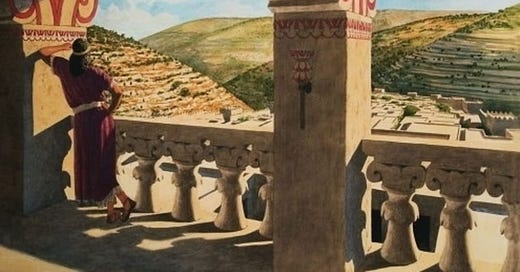Matthew opens his Gospel with a statement of Jesus’ right to occupy David’s throne. Mark and Luke do too, but they do things their own way, and reveal a lot about kingship in the process.
Kings were always part of God’s plan. Back in Genesis 17, Abraham was told kings would come forth from his loins. And they soon did.
From Israel’s perspective, however, kings were a two-edged sword. They could bring about the best of times and the worst of times.
In Deuteronomy 17, Moses was quite candid about the potential problems with kings. They could easily acquire ‘lots of horses’ and/or ‘lots of wives’ and/or ‘lots and lots of silver and gold’, which would lure both them and their people away from God. In addition, their hearts were likely to be ‘lifted up’ in pride (Deut. 17).
Before long, Israel became familiar with such issues. Consider, for instance, the life of David.
The text of 2 Samuel 8 documents some of David’s early victories as a king. Mixed in with David’s victories, however, are notable causes for concern. As a result of his victories over the nations, David amassed large amounts of silver and gold (cp. ‘lots of silver and gold’!). In addition, he chose to keep ‘a hundred chariot horses’ for himself, which is the first time horses are numbered in Israel (cp. ‘many horses’!). And a further note of intrigue is added by David’s appointment of his sons as ‘priests’ (?) (kohanim), which may have been an early indicator of his pride (cp. the way in which the pride of king Uzziah’s heart led him to perform a priestly task: 2 Chr. 26.16). Hence, when David fell in 2 Samuel 11, the stage was set. David already had at least six wives, and possibly concubines to boot (1 Chr. 3.1–9) (cp. ‘many wives’!).
But David’s fall wasn’t an isolated event in history. Other kings fell in similar ways, which shouldn’t surprise us, since their hearts were similarly affected by Adam’s fall.
Consider some of the parallels between the way in which David and Nebuchadnezzar fell (cp. 2 Sam. 11–12 w. Dan. 4).
One day, both men decided to take a walk on their palace roof--that is to say, they raised themselves up--, which was the precursor to their downfall.
Despite their sin, both men thought they’d avoided God’s attention, yet were shaken out of their slumber by a familiar voice (cp. Nathan’s pronouncement in 2 Sam. 11.27 and 12.7 with the watcher’s in Dan. 4.31).
Due to their pride, both men were brought low and exiled from their kingdom.
And, while both men were restored at the end of seven periods of time (cp. 2 Sam. 12.18–24), their sons inherited their sinful tendencies (cp. the sexual sin of Amnon and the pride of Belshazzar).
David and Nebuchadnezzar thus fell in very similar ways.
At the outset of his Gospel, however, Mark introduces us to a man who inverts the experiences of Nebuchadnezzar: Jesus.
Consider the inverted parallels between the fall of Nebuchadnezzar and the emergence of Jesus at the outset of Mark and Luke’s Gospels.
These inverted parallels are significant. (As readers of Scripture, we need to be attentive not just to patterns, but to deviations from those patterns.) Jesus passes ‘the kingship test’ precisely where those before him fail it. Unlike Nebuchadnezzar, Jesus is a man who can be trusted with power. His temptations don’t expose any weakness in him, but only highlight his moral purity. And the next time something is ‘rent’ in two (σχίζω) in Mark’s Gospel (in ch. 1, it’s the heavens; in ch. 15, the temple veil), we encounter a further inversion--an inversion of the world’s notion of kingship. We see the king of the Jews, enshrouded in darkness, ready to lay down his life for the sake of his people, on the basis of which act he will soon be seated on David’s heavenly throne (Rev. 5.2, 5, 13).






